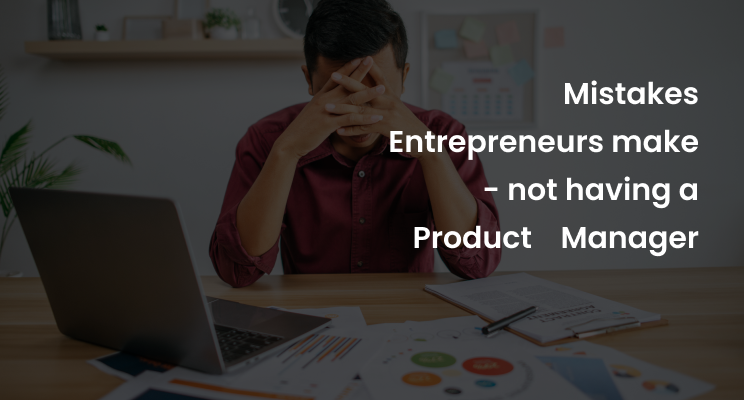
As a part of MVP Rockets, we work with multiple entrepreneurs at various phases of product building. This gives us some unique perspectives about their works and mistakes.
Do you know what that mistake is? They don’t have a product manager.
These entrepreneurs try and build the product, themselves assuming the role of the product manager. Oftentimes they don’t understand what the value that a PM brings to the table & the role the PMs play in successful building of a product.
The usual reasons they give are:
- I know what needs to be built (This is a simple product, why do I need a PM?)
- The developers can build the product according to my requirements
- Product managers are simply project managers (What else do they do?)
- And the worst of all – Product Management is a common sense (Anyone can do this)
Entrepreneurs have to take care of multiple things like sales, fundraising, evangelising the story in the ecosystem, community building, compliance work and a lot more.
Not having a dedicated product manager harms a company in many ways.
Let’s look at the various roles that a product manager plays in product building.
Role of a Product Manager in a Startup

Problem Definition
There is always an urge to start directly with defining the product features.
But before getting to the solution space, it is important to understand the problem space.
- How big is the target market for this product?
- Who is the target user?
- What are the user’s pain points?
- What are the (one or multiple) hypotheses we are making when building the product?
- How do we validate those hypotheses?
The early stages of a startup should ideally be like a laboratory running multiple experiments/hypotheses. The product manager drives the experiments by first identifying what experiments to run (along with the founder) and then measuring the success of it.
One of the biggest requirements of a Product manager is asking the right questions. The aim is not to solve all the problems themselves. They do solve a lot of the problems – but before they go on to solve those, defining the right problem to solve is a key value they add.
Problem-solving
A product manager serves a major role in solving complex problems and coming up with cool product ideas. This is what attracts most people to product management.
This entails the product manager asking some questions about the user, their pain points, their current alternatives, and their biggest competition.
The best way to go about this is to learn certain frameworks that have been useful in successful projects. Some of these frameworks are:
- Business Model or Product canvas
- Fogg’s behaviour model (B=MAT)
- Incentive theory of motivation
- Hook model for Habit-forming products
- First-principles thinking and usage of the 5 Whys technique
- Eisenhower decision matrix
Honestly, there are several frameworks to use for creating better products. The idea is to understand that there is a structured way to solve complex problems and increase the success probability.
Product Managers should ideally know about most of these frameworks. With experience, they can get the idea of the most suitable one for specific problems.
Hence, a founder cannot be doing this. This is a specialised job and requires undivided time and attention.
Planning and Communication
“If a man not knows to what port he sails, no wind is favorable”
Even if we have all-stars in the team, they should have absolute clarity about these 3 W’s:
- What should they work on?
- Why are they working on this?
- When should they work on it?
To ensure full productivity and efficiency, the team must be clear about their workings and giving them this clarity demands a person who is dedicatedly available for them.
A founder cannot focus on everything alone. Ideally, the Product Manager should communicate the exact requirements and give absolute transparency on what each one in the team needs to be working on.
A product manager is responsible to ensure that each team member is
- Working on the primary task assigned to them.
- Understanding the larger problem they are solving.
- Crystal clear about their requirements and deliverables.
Maintaining an Optimum Pressure
Every product building, like every organisation building, is a marathon and not a sprint. The startups are infamous for long working hours and weekend working, but this happens mainly due to improper project management & lack of clear communication.
We, at MVP Rockes, advocate the principle of ‘Optimum pressure’, where throughout the project, an optimum pressure is maintained on the team.
Now, pressurising them doesn’t mean making them work beyond their capacity. The idea is to hold the team accountable and honest about their commitment and deliverables. Here again, a product manager comes into the role.
This can be achieved by diligently planning for the project, having rituals like Sprint planning, daily stand-ups, sprint retrospectives periodically and using tools like Slack, Notion or Jira in the workplace.
Managing Stakeholders
Having effective communication is one of the most significant roles of the product manager. For successful product building, various people playing multiple roles have to come together and the product manager is often the anchor point around which the team has to be built.
- Designers should know what they should design and what problems they should solve.
- Developers should know the most important thing to work on.
- The Sales and Marketing team should know what to expect in a week, a month, and a quarter from now.
- Clients should be aware of the current status of the product and check if they are on track.
- Company leadership should know what are the blockers and what they should be unblocking
Measure the success of the product functionalities
There are numerous tools for measuring product metrics such as GA, Hotjar, Crazyegg, Mixpanel. Add to this mix, the capability of AB experiments and you have a whole host of tools that give you tons of data.
Identify the key tools to be integrated and spend time looking at the data coming in from the product. Form a hypothesis and create a case for making new functionalities or removing the existing ones.
As one can see, doing all this demands the full-time attention and devotion of a person. This is not something that a founder can do by spending a couple of hours a day.
We have noticed an improvement in the quality of the products under the supervision of the product manager as compared to the one without them.
Role of a founder in products
Let’s have a look at the founder’s role in building a product and its management.
- Hire a product manager
One of the most important roles of a founder is to employ a suitable product manager who can understand his products and come up with effective ideas and solutions.
- Explain the vision to the Product Manager
A product manager should always have an immense understanding of the goal. Instead of guiding the product manager about the doings, define your larger goals and problems and let a PM execute them.
Get the product manager to buy into the larger vision and elevate them from being very tactical.
- Communicate the expectations clearly
Apart from the general problems, if there are some specific expectations in terms of functionalities, features or products, communicate them clearly to the product manager.
- Communicate the timelines and their importance
If there are timeline pressures, it’s important to discuss that.
Set achievable timelines, but be open to reset expectations because the expected timelines may not be feasible always just like how 9 women cannot give birth to a baby in one month. This would also help you plan for increasing the resources where required.
- Clear and timely feedback
Product managers can also make mistakes and this is inevitable. As a leader, the founder’s role is to provide quality and actionable feedback to them and allow them the time to learn and get better.
Providing feedback is by far the most important part of the growth of both the product manager and the startup. Communicate early and consistently.
From our experience, we have realised that apart from having a good product manager, we should ensure they have bought into the overall product management philosophy mentioned above and the expectation from them is clear.
This has helped us define and launch several products at a short interval and we hope it helps you too. If you want to know how we employ and train our product managers or anything related to project management, feel free to reach out to me on giri@mvprockets.com – We would be happy to help you!

